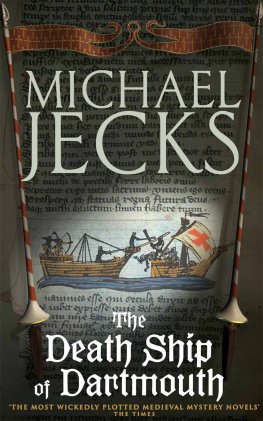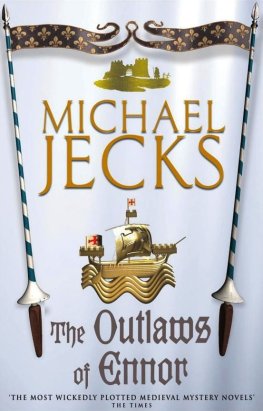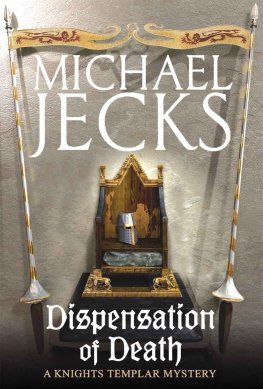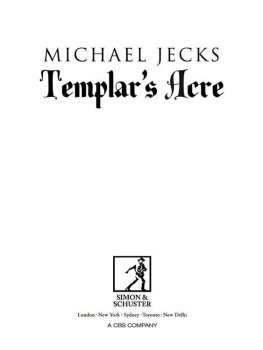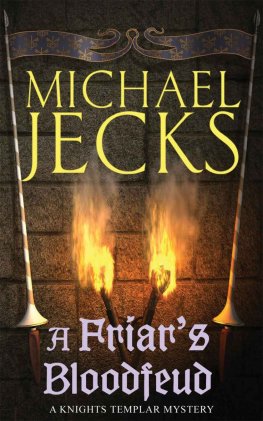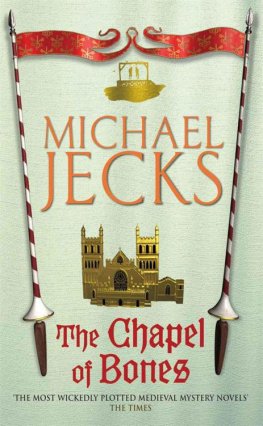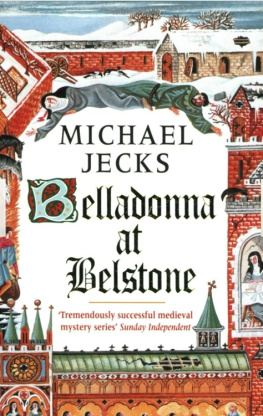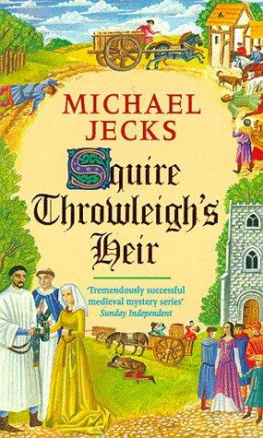Michael Jecks
THE MAD MONK OF GIDLEIGH
2002
For all at Caterham & District Rifle Club, but especially my good friend Hugh Keitch.
Good shooting!

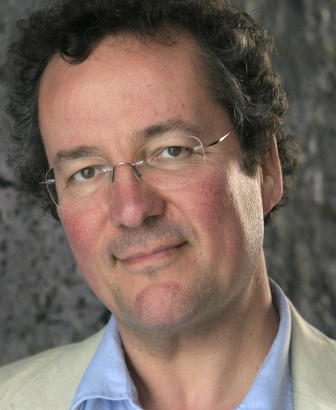
Michael Jecks gave up a career in the computer industry to concentrate on his writing. He is the founder of Medieval Murderers, has been Chairman of the Crime Writers Association, and helped create the Historical Writers Association. Keen to help new writers, for some years he organised the Debut Dagger competition, and is now organising the Aspara Writing festival for new writers at Evesham. He has judged many prizes, including the CWA Ian Fleming Steel Dagger. Michael is an international speaker on writing and for business. He lives with his wife, children and dogs in northern Dartmoor.
Michael can be contacted through his website: www.michaeljecks.co.uk.
He can be followed on twitter (@MichaelJecks) or on Facebook.com/Michael.Jecks.author.
His photos of Devon and locations for his books can be found at: Flickr.com/photos/Michael_Jecks.
There are too many people to whom I am indebted for me to mention them all, but I am especially grateful to Mike, a great countryman and local historian in his own right, for introducing me to his friend, the late Dickie Narracott, last hereditary Warden of the Bradford Leat. From them came the plot, and I am hugely grateful.
There is another person who must be thanked. In the week that my copy-editor asked where we could find a vocabulary of medieval curses and insults, along came an email with thirty-odd. Max, thanks!
Finally I have to thank those who have helped, advised, guided and slapped me down occasionally: first my wife Jane, then my agent Jane; Marion, Andi and Shona, the worlds three best commissioning editors (I would say that, wouldnt I), and Joan Deitch, for copy editing with courage, conviction and courtesy.
Having said all that, of course, I have to point out that all errors are their fault and not mine.
Benefit of Clergy
If a priest or monk was accused of a crime, he could claim the benefit of being tried only by his peers in an ecclesiastical court. This meant that he was safe from penalties of life and limb he couldnt be hanged. To prove his eligibility, he had to recite, usually, the pater noster in Latin or a similar sequence that only a cleric would be expected to know.
Chevauche
A small band of warriors on a raiding party; the name was given to the raid or campaign as well as the group itself.
Frankpledge
All the male inhabitants of a vill were automatically members of the Frankpledge. At the age of twelve they had to swear to keep the peace and to restrain anyone who did not. All members were answerable for any infringements and for damages caused by others. This system was imposed by the Franks (the Normans) after the invasion.
Grace
In the 1300s Grace could be said either before or after the meal, unlike today when it is invariably spoken before the meal.
Leyrwyte
A fine imposed on women for sexual incontinence.
Pater Noster
The Our Father prayer; at the time of Baldwin and Simon, it was known only by priests and recited in Latin.
Petty Treason (petit treason)
The term given to simple treachery. It was the treason of a serf to his master, or even a wife to her husband, as opposed to high treason, which was treachery against the Crown.
Placebo
This was the evensong of the dead, known from the first word of the service.
Seven Interrogations
The seven questions asked by a priest to confirm that a dying person believed in God, the scriptures, Jesus, and that God would forgive those who sincerely regretted their sins and offences.
Seyney
Many monks lived in conditions of extreme hardship, and there were times when they had to be sent away for a short period to recover. At such times, they would be rested and given better food, including good cuts of meat. This recreational period was known as a seyney.
Stannaries
The Stannaries of Devon were any locations in which miners claimed to have found tin to mine. These sometimes lay beyond the bounds of Dartmoor, which at the time was a relatively small area.
Vill
A basic administrative area. It could mean a single farm, a hamlet, a small town, borough or city. Every part of England belonged to a vill. In later years, the vill or group of vills grew to become a parish, but this did not happen until the Tudor period.
Sir Baldwin de Furnshill
Once a Knight Templar, he has returned to his old family home in Devon where he is now Keeper of the Kings Peace. Hes known to be an astute investigator of violent crime.
Lady Jeanne
His wife, to whom he has been married for two years. Jeanne is a widow whose first husband abused her. She has now learned to enjoy married life.
Edgar
Baldwins servant and Steward.
Simon Puttock
Bailiff of the Stannaries, and Baldwins closest friend and trusted companion. Based at the administrative and legal centre of the Stannaries, Lydford Castle, Simon is responsible for keeping the peace wherever miners work under the Warden of the Stannaries, Abbot Robert Champeaux of Tavistock.
Margaret Puttock (Meg)
Simons wife, the daughter of a farmer, whom he married many years ago.
Edith
Simon and Megs daughter, some fifteen years old.
Hugh
Simons servant of many years.
Elias
A sad, widowed ploughman.
Sir Richard Prouse
Terribly wounded in a tournament in 1316, he is the impecunious owner of Gidleigh Castle until his death in 1322 aged thirty.
Mark
On the death of the previous incumbent, he was given the chapel at Gidleigh. The monk is not happy in the rural backwater.
Piers
An intelligent and hardworking peasant, now Reeve in the vill.
Henry
Pierss young, somewhat feckless son.
Huward
The miller, living near to the castle.
Gilda
Tall, attractive wife to Huward.
Mary
Eldest daughter of Huward and Gilda, she is known for her kindness and beauty.
Flora
The younger of Huwards two daughters, and perhaps not so attractive as Mary.
Ben
The millers spoiled and precocious son.
Osbert
A local freeman who adores Mary, but whose affection is not reciprocated.
Sir Ralph de Wonson
Master of Wonson Manor, he acquires Gidleigh on Sir Richards death.
Esmon
Son of Sir Ralph, he is an experienced warrior and successful raider.
Lady Annicia
Wife of Sir Ralph and mother to Esmon.
Surval
The hermit who tends to Chagford Bridge, maintaining the small chapel at which he prays for travellers and pleads for forgiveness.
Roger Scut
A cleric at the canonical church of Crediton, he makes notes during Baldwins inquests.


